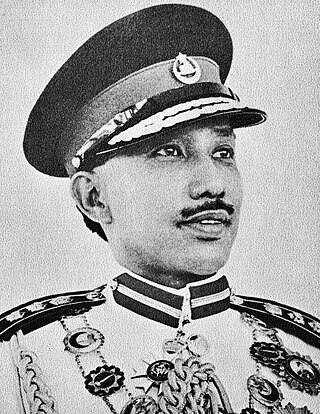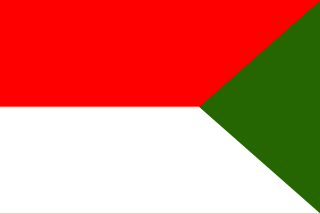
TunkuAbdul Rahman Putra Al-Haj ibni Almarhum Sultan Abdul Hamid Halim Shah was a Malaysian statesman and lawyer who served as the first prime minister of Malaysia and the head of government of its predecessor states from 1955 to 1970. He was the first chief minister of the Federation of Malaya from 1955 to 1957. He supervised the independence process that culminated on 31 August 1957. As an independent Malaysia's first prime minister, he dominated the country's politics for the next 13 years.

Mohamed Bolkiah ibni Omar Ali Saifuddien III is a member of the royal family of Brunei. He is the second son of Omar Ali Saifuddien III, the 28th Sultan of Brunei, and Raja Isteri (Queen) Pengiran Anak Damit. After Brunei's independence in 1984, he became the country’s first foreign minister, serving from 1 January 1984 until 22 October 2015, alongside the second Minister of Foreign Affairs and Trade, Lim Jock Seng.

Omar Ali Saifuddien Sa'adul Khairi Waddien was the 28th Sultan of Brunei, reigning from 1950 until his abdication in 1967 to his oldest son, Hassanal Bolkiah.

Malcolm John MacDonald was a British politician and diplomat. He was initially a Labour Member of Parliament (MP), but in 1931 followed his father Ramsay MacDonald in breaking with the party and joining the National Government. He was consequently expelled from the Labour Party. He was a government minister during the Second World War and was later Governor of Kenya.

Bendahara was an administrative position within classical Malay kingdoms comparable to a vizier before the intervention of European powers during the 19th century. A bendahara was appointed by a sultan and was a hereditary post. The bendahara and the sultan shared the same lineage.
Brunei National Solidarity Party (BNSP), natively known as the Parti Perpaduan Kebangsaan Brunei (PPKB), was a political party established in Brunei. The party quickly gained recognition, composed of business people loyal to Sultan Hassanal Bolkiah, with principles based on Sunni Islam and liberal nationalism. Internal issues led to the formation of the PPKB in February 1986, which the Sultan also approved.

The Legislative Council of Brunei is a national unicameral legislature of Brunei. The council comprises 36 appointed members, that only has consultative tasks. Under Brunei's 1959 constitution, His Majesty Hassanal Bolkiah is the head of state with full executive authority, including emergency powers since 1962. The Council holds its sitting annually in March at the Legislative Council Building in Bandar Seri Begawan.

The Paduka Seri Begawan Sultan Science College, colloquially known as Maktab Sains (MS), is a government secondary school and sixth form college in Bandar Seri Begawan, Brunei. It is regarded as Brunei's top government-run secondary school; it admits only exceptional pupils and is well-known for its rigorous standards for both academic and extracurricular accomplishment.

The prime minister of Brunei is the head of government of Brunei. Concurrently, the title is held by the sultan of Brunei, who as sultan is also the head of state of the country. The prime minister, minister of foreign affairs, minister of finance and economy, and minister of defence are all the Sultan of Brunei. He is Brunei's Supreme Executive Authority in his capacity as the Sultan and Yang Di-Pertuan. The Privy Council, the Council of Succession, the Religious Council, the Council of Cabinet Ministers, and the Legislative Council support him in carrying out his responsibilities.

Brunei People's Party (BPR), also known as Parti Rakyat Brunei (PRB), is a banned political party in Brunei. The party was established as a left-wing party in 1956 and aimed to bring Brunei into full independence from the United Kingdom. The party called for a constitution that would unite Brunei, North Borneo, and Sarawak under a fully democratic government, the Unitary State of North Kalimantan or Negara Kesatuan Kalimantan Utara (NKKU). However, in 1958 the British publicised their own ideas and rejected the Borneo union ambitions of the PRB, seeking instead for a gradual democratic transformation. The PRB's reactions to both the plan for a Federation of Malaysia and the Constitution of Brunei led to a mutiny in the first part of December 1962.
District council elections were held for the first time in Brunei on 30 August 1962. A total of 55 seats on the four district councils were contested by the Brunei People's Party, the Brunei National Organisation (6), the Brunei United Party (1) and eighteen independents. The BPP won 54 seats, whilst the sole independent elected later joined the party. Voter turnout was around 89%.
The politics of Brunei take place in a framework of an absolute monarchy, whereby the Sultan of Brunei is both head of state and head of government. Brunei is the only ruling state with an absolute monarchy in Southeast Asia. As of 2023, Brunei is one of seven monarchic dictatorships in the world.

Hassanal Bolkiah Muiz'zaddin Wad'daulah is Sultan of Brunei since 1967, and prime minister of Brunei since its independence from the United Kingdom in 1984. He is one of the few remaining absolute monarchs in the world.

Marsal bin Maun was a Bruneian politician and educator who served as the second Menteri Besar of Brunei from 1961 to 1962. His tenure was marked by the outbreak of the Brunei revolt in December 1962. Marsal played a pivotal role in establishing both the Brunei Malay Teachers Association (PGGMB) and the Brunei Scout Movement, which continue to thrive today. A prominent figure within the PGGMB, he was also closely associated with Sultan Omar Ali Saifuddien III. He was one of the "three M's" that concerned the British government, alongside Pengiran Muhammad Ali and Pengiran Muhammad Yusuf.

Ibrahim bin Mohammad Jahfar was an aristocrat and politician who became Brunei's first Menteri Besar, serving from 29 September 1959 to 1 August 1962. He played a key role in advising Sultan Omar Ali Saifuddien III on significant developments, including the National Development Plan and the drafting of Brunei's written constitution. Throughout his career, Ibrahim held several important positions, including private secretary to the Sultan, Speaker of the Legislative Council, member of the Privy Council, and Secretary of State to the British Resident.

Pengiran Muhammad Yusuf bin Pengiran Haji Abdul Rahim, pen name Yura Halim, was a Bruneian nobleman, politician, civil servant, diplomat, and writer. He served as the Menteri Besar of Brunei from 1967 to 1972. He wrote the lyrics for Brunei's national anthem, "Allah Peliharakan Sultan," in 1947. The song was adopted as the country's official national anthem in 1951, when it was still a British protectorate. He was longtime member of the Legislative Council of Brunei, serving on the council until his death in 2016.
The second Sarawak district council elections was held in 1963. The results of the election was announced from 18 to 25 June 1963. A total of 185,000 voters cast votes in this election, and a total of 998 candidates were vying for 429 district council seats in Sarawak.

Sufri Bolkiah ibni Omar Ali Saifuddien III is a member of the royal family of Brunei. He is the third son of Omar Ali Saifuddien III, the 28th Sultan of Brunei, and Raja Isteri (Queen) Pengiran Anak Damit. He is also the President of the Brunei Darussalam National Olympic Council (BDNOC) since 2010.

The Speaker of the Legislative Council of Brunei is a pivotal figure in the governance process, responsible for managing the proceedings and voting within the council, ensuring transparency in legislative decisions. Appointed by the Head of State, the Speaker ranks fourth in the state hierarchy and does not assume the role of interim head of state during transitions. This position is vital for maintaining democratic principles and accountability within Brunei's legislative framework.

The Brunei Malay Teachers Association was founded in 1937 and became a legally recognised nonprofit union with a democratic style of leadership in 1939. The founding members of PGGMB, who are also educators who have earned their degrees from the Sultan Idris Training College (SITC), took the initiative to start the organisation. It broadened its activities following World War II by creating a cooperative to promote Malay involvement in business and was instrumental in the founding of Barisan Pemuda (BARIP), Brunei's first nationalist organisation.
















